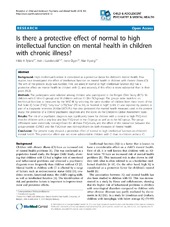| dc.contributor.author | Ryland, Hilde Katrin | |
| dc.contributor.author | Lundervold, Astri Johansen | |
| dc.contributor.author | Elgen, Irene Bircow | |
| dc.contributor.author | Hysing, Mari | |
| dc.date.accessioned | 2011-04-29T07:31:12Z | |
| dc.date.available | 2011-04-29T07:31:12Z | |
| dc.date.issued | 2010-01-20 | eng |
| dc.Published | Child and Adolescent Psychiatry and Mental Health 4:3 | en_US |
| dc.identifier.issn | 1753-2000 | |
| dc.identifier.uri | https://hdl.handle.net/1956/4715 | |
| dc.description.abstract | Background High intellectual function is considered as a protective factor for children's mental health. Few studies have investigated the effect of intellectual function on mental health in children with chronic illness (CI). The aim of the present study was twofold: First, we asked if normal to high intellectual function (IQ) has a protective effect on mental health in children with CI, and secondly, if this effect is more substantial than in their peers (NCI). Methods The participants were selected among children who participated in the Bergen Child Study (BCS): 96 children with CI (the CI-group) and 96 children without CI (the NCI-group). The groups were matched on intellectual function as measured by the WISC-III by selecting the same number of children from three levels of the Full Scale IQ Score (FSIQ): "very low" (<70),"low" (70 to 84), or "normal to high" (>84). CI was reported by parents as part of a diagnostic interview (Kiddie-SADS-PL) that also generated the mental health measures used in the present study: the presence of a DSM-IV psychiatric diagnosis and the score on the Children's Global Assessment Scale. Results The risk of a psychiatric diagnosis was significantly lower for children with a normal to high FSIQ-level than for children with a very low and low FSIQ-level in the CI-group as well as in the NCI-group. The group differences were statistically non-significant for all three FSIQ-levels, and the effect of the interaction between the group-variable (CI/NCI) and the FSIQ-level was non-significant on both measures of mental health. Conclusion The present study showed a protective effect of normal to high intellectual function on children's mental health. This protective effect was not more substantial in children with CI than in children without CI. | en_US |
| dc.language.iso | eng | eng |
| dc.publisher | BioMed Central | eng |
| dc.relation.ispartof | <a href="http://hdl.handle.net/1956/9250" target="blank">Social functioning and mental health in children: the influence of chronic illness and intellectual function</a> | eng |
| dc.rights | Attribution CC BY | eng |
| dc.rights.uri | http://creativecommons.org/licenses/by/2.0 | eng |
| dc.title | Is there a protective effect of normal to high intellectual function on mental health in children with chronic illness? | eng |
| dc.type | Peer reviewed | |
| dc.type | Journal article | |
| dc.description.version | publishedVersion | |
| dc.rights.holder | Copyright 2010 Ryland et al; licensee BioMed Central Ltd. | |
| dc.rights.holder | Ryland et al. | eng |
| dc.identifier.doi | https://doi.org/10.1186/1753-2000-4-3 | |
| dc.identifier.cristin | 520450 | |

